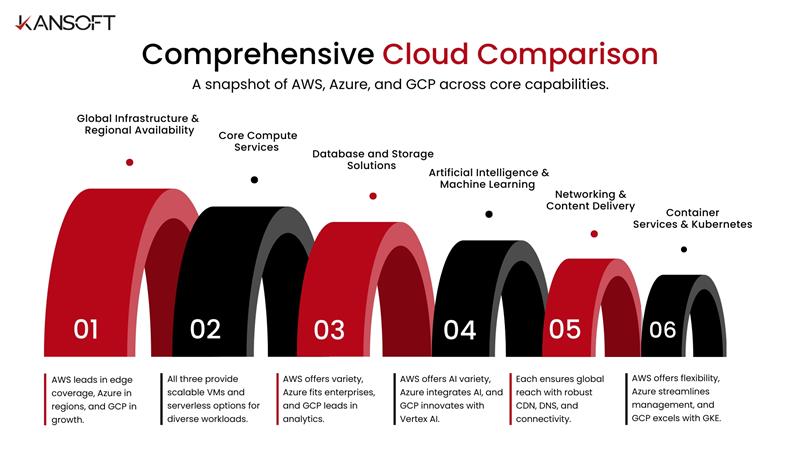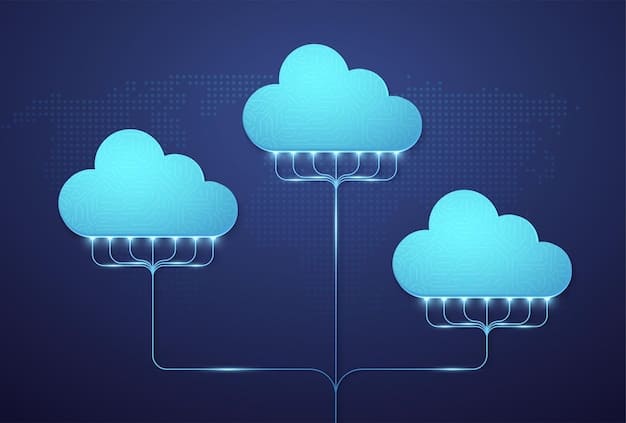Cloud computing has fundamentally transformed how enterprises manage their digital infrastructure. As organizations increasingly migrate from on-premises servers to cloud environments, three dominant cloud service providers have emerged as industry leaders: Amazon Web Services (AWS), Microsoft Azure, and Google Cloud Platform (GCP). Understanding the strengths, capabilities, and value propositions of each cloud platform is essential for making informed decisions about your enterprise’s cloud strategy.
This comprehensive cloud comparison will help you evaluate AWS vs Azure vs GCP to determine which platform best aligns with your business objectives and technical requirements.
Understanding the Big Three Cloud Platforms
Amazon Web Services (AWS): The Market Pioneer
Amazon Web Services stands as the undisputed market leader in cloud computing, commanding approximately one-third of all global cloud spending. What began as an internal cloud infrastructure project evolved into a publicly available cloud platform in 2006, launching with foundational services like Amazon S3 cloud storage and Elastic Compute Cloud (EC2).
Today, AWS offers more than 250 fully featured services spanning compute, storage, databases, analytics, machine learning, and specialized technologies, including quantum computing through Amazon Braket. The platform serves millions of users ranging from individual developers to Fortune 500 enterprises and government agencies. Notable AWS customers include Netflix, Expedia, Coinbase, Formula 1, and the U.S. Food and Drug Administration.
Microsoft Azure: The Enterprise Cloud Champion
Microsoft Azure has rapidly established itself as the second-largest cloud platform, with particularly strong adoption among enterprise customers. Launched in 2010, Azure now provides over 200 products and services, with more than 95% of Fortune 500 companies utilizing the platform.
Azure’s strategic advantage lies in its seamless integration with Microsoft’s extensive enterprise software ecosystem. Organizations already using Windows Server, Active Directory, SQL Server, and Microsoft 365 can transition to Azure with reduced friction and cost. This integration extends to hybrid cloud scenarios, making Azure particularly attractive for enterprises pursuing gradual cloud migration strategies.
Beyond Microsoft-centric solutions, Azure supports open-source languages, technologies, and platforms, providing flexibility for diverse development needs. Prominent Azure customers include DAIMLER AG, the Centers for Disease Control and Prevention (CDC), HSBC, Starbucks, and the UK’s National Health Service (NHS).
Google Cloud Platform (GCP): The Innovation Challenger
While Google Cloud Platform is the smallest of the three major cloud service providers, it represents the fastest-growing option with exceptional year-over-year expansion. GCP leverages Google’s expertise in data analytics, artificial intelligence, and machine learning to differentiate itself in the competitive cloud market.
GCP offers over 200 services built on the same infrastructure that powers Google’s consumer products like Search, YouTube, and Gmail. This foundation provides exceptional performance for big data processing, machine learning workloads, and containerized applications.
Notable GCP customers include Toyota, Spotify, Nintendo, The Home Depot, Target, and PayPal. These organizations benefit from Google’s innovations in areas like Vertex AI for machine learning, BigQuery for analytics, and Anthos for multi-cloud management.
Comprehensive Cloud Comparison: Services and Capabilities
When conducting an AWS vs Azure vs GCP evaluation, understanding the specific capabilities of each cloud service provider is crucial for enterprise decision-making.
Global Infrastructure and Regional Availability
When evaluating cloud platforms, regional availability directly impacts application performance, data compliance, and business continuity. Each cloud service provider maintains extensive global infrastructure:
AWS operates 33 geographic regions with 105 availability zones, serving content through 600+ edge locations. The company plans to add seven more regions with 21 additional availability zones to meet growing demand. Learn more about AWS global infrastructure.
Microsoft Azure maintains the broadest physical presence with 64 regions (including 15 under construction) and 126 availability zones (with 37 more being built). Azure operates 192 edge locations across global cities, plus four dedicated edge locations for U.S. government cloud services.
Google Cloud Platform provides 40 cloud regions with eight new regions planned, encompassing 121 zones and 187 edge locations worldwide.
All three cloud service providers offer specialized government cloud solutions and continue expanding their geographic footprint to serve customers in emerging markets and regulatory jurisdictions.
Core Compute Services
Each cloud platform provides robust compute capabilities with distinct approaches and branding:
AWS offers Elastic Compute Cloud (EC2) for virtual machines, Lambda for serverless computing, Elastic Beanstalk for application deployment, and specialized instances including EC2 High Memory U7i Instances supporting up to 32TB of memory.
Azure provides Virtual Machines, Azure Functions for serverless operations, and specialized offerings like M-series Mv3 family for memory-intensive workloads. Azure’s integration with Visual Studio and .NET frameworks provides advantages for Microsoft-oriented development teams.
GCP delivers Compute Engine for virtual machines, Cloud Run for containerized applications, and App Engine for serverless deployments. GCP’s memory-optimized machine family provides up to 32TB of memory with a 99.95% reliability service level agreement.

Database and Storage Solutions
Data management capabilities represent critical differentiators in this cloud comparison:
AWS provides a comprehensive database portfolio including Amazon RDS for relational databases, DynamoDB for NoSQL, Aurora for PostgreSQL and MySQL, Redshift for data warehousing, and ElastiCache for in-memory caching. Storage options include S3 for object storage and EBS for block storage.
Azure offers Azure SQL Database, Cosmos DB for multi-model database needs, Synapse Analytics for data warehousing, and various storage tiers through Azure Blob Storage and Azure Managed Disks.
GCP differentiates with AlloyDB for PostgreSQL (delivering 4x faster transactional performance than standard PostgreSQL), Spanner for globally distributed databases, BigQuery for serverless analytics, Bigtable for NoSQL workloads, and Cloud Storage for object storage needs.
Artificial Intelligence and Machine Learning
AI and ML capabilities increasingly drive cloud platform selection:
AWS provides Amazon SageMaker for model development, Rekognition for image analysis, Comprehend for natural language processing, and various purpose-built AI services.
Azure offers Azure Machine Learning, Cognitive Services for pre-built AI capabilities, and Azure OpenAI Service for accessing advanced language models.
GCP leads with Vertex AI for unified ML development, Vertex AI Model Garden for foundation models, specialized APIs for vision, speech, and translation, and Document AI for intelligent document processing.
Networking and Content Delivery
Network architecture and content delivery capabilities ensure optimal application performance:
AWS implements Virtual Private Cloud (VPC), CloudFront for content delivery, Route 53 for DNS management, and Direct Connect for dedicated connectivity to on-premises infrastructure.
Azure provides Virtual Network (VNet), Azure Front Door for content delivery and security, Azure DNS, and ExpressRoute for hybrid connectivity.
GCP offers Virtual Private Cloud, Cloud CDN and Media CDN for content delivery, Cloud DNS, and Cloud Interconnect for enterprise connectivity. GCP’s premium network tier leverages Google’s global network infrastructure for exceptional performance.
Container Services and Kubernetes
Container orchestration has become central to modern application architecture:
AWS provides Elastic Kubernetes Service (EKS), Elastic Container Service (ECS), and Fargate for serverless containers.
Azure offers Azure Kubernetes Service (AKS) with automatic cluster management features and Azure Container Instances for rapid container deployment.
GCP delivers Google Kubernetes Engine (GKE), the most mature Kubernetes implementation, given Google’s role in creating Kubernetes. GKE Autopilot provides fully managed cluster operations, while Anthos enables multi-cloud management across AWS, Azure, and on-premises environments.
Strategic Considerations for Enterprise Cloud Selection
Pricing and Cost Management
In the AWS vs Azure vs GCP pricing comparison, all three cloud service providers employ consumption-based pricing models with variations in specific service costs:
Microsoft Azure generally offers the most competitive on-demand pricing, particularly for enterprises already licensed for Microsoft software. Azure’s hybrid benefit programs can deliver significant cost savings for Windows Server and SQL Server workloads.
AWS typically positions pricing in the mid-range, with extensive options for reserved instances, savings plans, and spot instances to optimize costs for predictable workloads.
Google Cloud Platform competes aggressively on pricing for compute and storage, with sustained use discounts automatically applied without long-term commitments. GCP’s per-second billing granularity can provide cost advantages over competitors charging by the hour.
Integration and Ecosystem
AWS benefits from the largest ecosystem of third-party integrations, consulting partners, and marketplace offerings. The AWS Marketplace provides thousands of pre-configured software solutions.
Azure excels at enterprise integration with Microsoft technologies, Active Directory, and Office 365. Organizations heavily invested in Microsoft’s ecosystem find Azure migration straightforward.
GCP emphasizes open-source integration and data analytics capabilities. The platform’s commitment to open standards and APIs facilitates multi-cloud strategies and reduces vendor lock-in concerns.
Security and Compliance
All three platforms maintain robust security credentials and compliance certifications:
AWS provides extensive security services including IAM, GuardDuty for threat detection, and dedicated government cloud regions. AWS GovCloud serves U.S. government agencies with stringent compliance requirements.
Azure offers comprehensive security through Microsoft Defender for Cloud, Azure Security Center, and specialized compliance offerings for regulated industries. Azure Government serves public sector customers.
GCP implements security through Cloud Security Command Center, VPC Service Controls for data exfiltration prevention, and Google’s expertise in infrastructure security. Assured Workloads provides controls for EU data sovereignty and other regional compliance requirements.
Making the Right Choice: AWS vs Azure vs GCP
The optimal cloud platform depends on your specific requirements, existing technology investments, and strategic objectives. Here’s a detailed breakdown for the AWS vs Azure vs GCP decision:
Choose AWS if you need the broadest service catalog, require specialized capabilities like quantum computing or IoT, or prioritize the largest partner ecosystem and marketplace offerings.
Choose Azure if your organization is heavily invested in Microsoft technologies, requires seamless hybrid cloud integration, or needs strong enterprise support for Windows-based applications.
Choose GCP if data analytics and machine learning are core requirements, you’re committed to container-based architectures with Kubernetes, or you value Google’s innovations in AI and open-source technologies.
The Multi-Cloud Reality
Increasingly, enterprises are adopting multi-cloud strategies rather than committing exclusively to a single cloud service provider. This approach allows organizations to leverage each platform’s unique strengths while avoiding vendor lock-in. A multi-cloud strategy might utilize AWS for its comprehensive service catalog, Azure for Microsoft workload integration, and GCP for advanced data analytics and machine learning capabilities.
Tools like Terraform for infrastructure as code, Kubernetes for container orchestration, and cloud management platforms enable effective multi-cloud operations. However, multi-cloud approaches introduce complexity in management, security, and cost optimization that must be carefully considered.
Partner with Kansoft for Your Cloud Journey
Navigating the complexities of AWS vs Azure vs GCP requires expertise, strategic planning, and ongoing optimization. Kansoft stands as a trusted partner for enterprises embarking on their cloud transformation journey. With deep expertise across all major cloud service providers, Kansoft helps organizations:
- Assess and strategize: Conduct comprehensive cloud readiness assessments and develop tailored cloud adoption strategies that align with your business objectives
- Architect and migrate: Design robust cloud architectures and execute seamless migrations with minimal disruption to business operations
- Optimize and manage: Implement cost optimization strategies, performance tuning, and ongoing cloud management to maximize ROI
- Secure and comply: Ensure robust security postures and regulatory compliance across multi-cloud environments
- Innovate and scale: Leverage cutting-edge cloud services for AI/ML, data analytics, and application modernization
Kansoft’s team of certified cloud architects and engineers brings hands-on experience with AWS, Azure, and GCP, enabling objective recommendations based on your unique requirements rather than vendor preferences. Whether you’re pursuing a single-cloud or multi-cloud strategy, Kansoft provides end-to-end support from initial consultation through post-deployment optimization.
Our proven methodology combines industry best practices with real-world implementation experience, ensuring your cloud platform investment delivers tangible business value. From startups to Fortune 500 enterprises, Kansoft has successfully guided organizations through complex cloud transformations, reducing time-to-value and eliminating costly mistakes.
Conclusion: Making an Informed Decision
The AWS vs Azure vs GCP decision represents a strategic choice that will impact your organization’s technology trajectory for years to come. AWS leads in market maturity and service breadth, Azure excels in Microsoft ecosystem integration and enterprise adoption, while GCP differentiates through data analytics innovation and open-source commitment.
The right choice depends on carefully evaluating your workload requirements, existing technology investments, compliance needs, and long-term strategic objectives. Many successful enterprises are finding that a thoughtful multi-cloud approach delivers the most value by capitalizing on each cloud platform’s distinctive strengths while maintaining operational flexibility.
When conducting your cloud comparison, consider engaging experienced partners like Kansoft who can provide objective guidance, accelerate your cloud adoption, and ensure you extract maximum value from your chosen cloud service providers. The cloud journey is complex, but with the right strategy and support, your organization can achieve unprecedented agility, innovation, and competitive advantage.
For detailed service comparisons and technical specifications, refer to Google Cloud’s service comparison documentation and BMC’s comprehensive cloud platform analysis.



